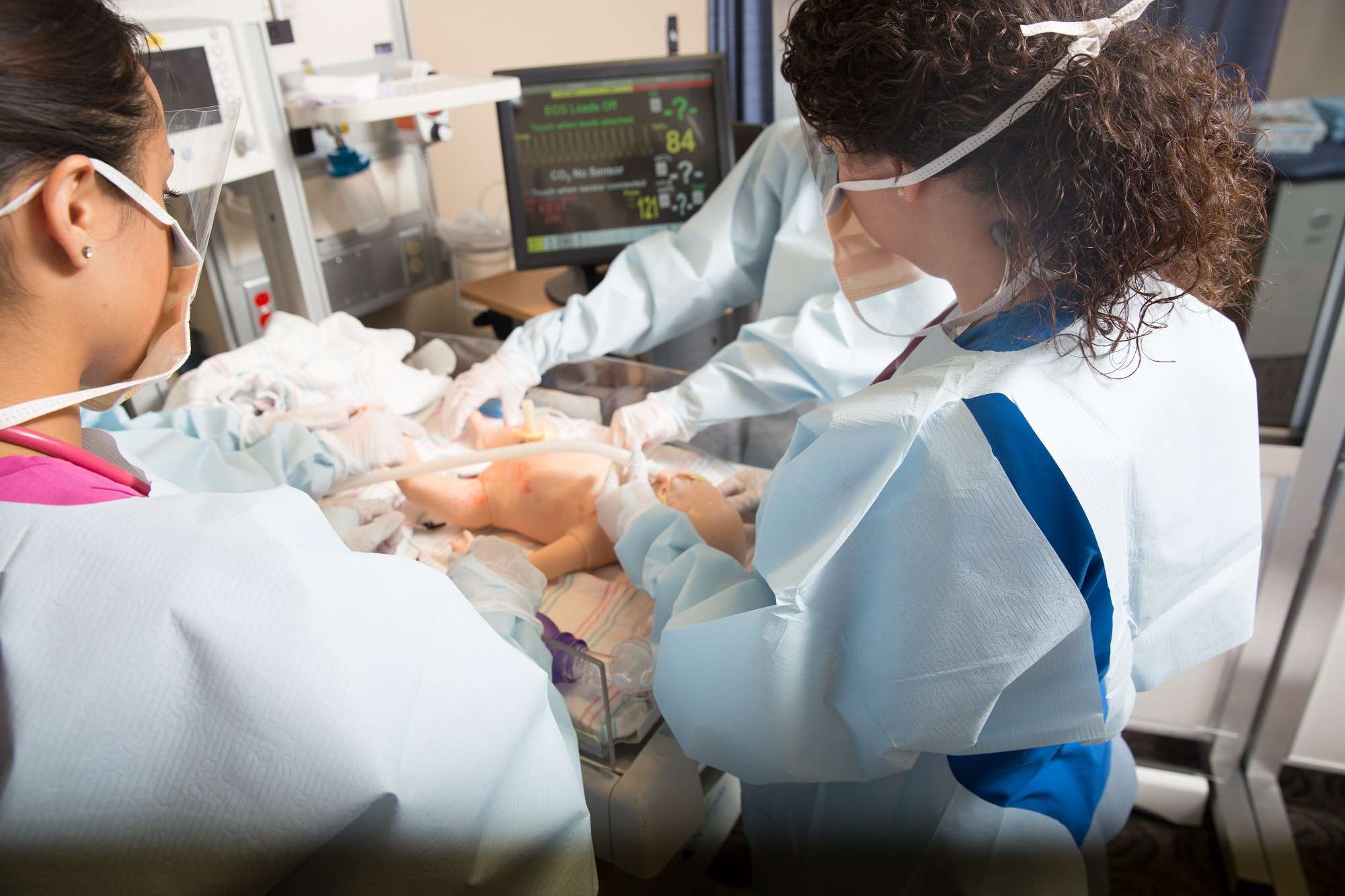Our Adult-Gerontology Acute Care Nurse Practitioner (AGACNP) track offers students the opportunity to practice in acute care settings, caring for patients from young adults to geriatrics. Graduates of the program will be prepared to sit for national certification by the American Nurse's Credentialing Center (ANCC) or the Association of Critical Care Nurses (AACN) Certification Corporation.
7
Semesters
14
Courses
Adult-Gerontology Acute Care Nurse Practitioner Program Curriculum
-
Semester 1 Course Number Course Name Hours GNRS 5373 Nursing Theory and Research 3 GNRS 5355 Advanced Pathophysiology 3 Semester 2 Course Number Course Name Hours GNRS 5298 Geriatric Syndromes 2 GNRS 5301 Advanced Pharmacology 3 GNRS 5346 Public Policy & Nursing 3 Semester 3 Course Number Course Name Hours GNRS 5307 Advanced Health Assessment 3 GNRS 5217 NP Diagnostic Reasoning and Procedures 2 Semester 4 Course Number Course Name Hours GNRS 5680 Common Problems of Adults 6 Semester 5 Course Number Course Name Hours GNRS 5624 AGACNP Episodic and Acute Illness 6 GNRS 5349 Informatics and Quality Improvement 3 Semester 6 Course Number Course Name Hours GNRS 5625 AGACNP Complex & Critical Care 6 GNRS 5350 Nurse Practitioner Professional Role and Business Principles 3 Semester 7 Course Number Course Name Hours GNRS 5027 AGACNP Role & Clinical Practicum 3 GNRS 53371 Public Health Principles in Advanced Practice Nursing 3
AGACNP Program Highlights
Leadership Immersion
Opportunities to immerse in the theoretical aspects of leadership practice & apply these theories in clinical settings.
Patient Care Outcomes
Critical thinking is developed to identify improvement opportunities & conduct change to improve care delivery & improve safety.
Real World Applications
Students increase skills in cost-effective problem solving, process improvement, risk assessment & the reduction of health care cost.
Faculty Expertise
Our caring, experienced and innovative faculty are known for their commitment to student success.
Online Flexibility
Students come to campus for orientation and each semester for 2-3 days. We have our own technical team to assist students with online learning.
Small Class Size
Our classes are small to allow for individual focused attention from faculty and in-depth networking opportunities with peers.
Clinical Practicum
The clinical experiences utilize the student's acquired skills to improve the quality of health care in their geographic location.
Frequent Questions
-
-
What does early notification review mean?
Our application dates are September 15th - March 15th for early notification review. Early notification review means if the applicant applies within the September 15th - March 15th timeframe, they are guaranteed a review and decision by April 15th. After the early notification review deadline date, applications will continue to be reviewed on a space available basis. Please call our office if you have questions!
-
What information will the School of Nursing consider when reviewing files for admission?
The school takes a holistic view in reviewing applications. Areas reviewed include life experiences, individual interests, any leadership, GPA/grade trends, health care experience, personal statement, and community service. The personal statements are extremely important and are carefully reviewed by the admissions committee. Pay close attention to spelling and grammar as this will be taken into consideration during the application review and should include your nursing and health related experience, as well as, explaining any interruptions in your work history. Focus on how your work experience prepares you for the MSN program for which you are applying and what prompted you to apply for this MSN program and how do you plan on utilizing your specific MSN degree post graduation.
-
How do I request credit for nursing courses taken at another school?
Graduate students may transfer up to twelve (12) credit hours. After you are admitted to the UTMB School of Nursing, you may submit a petition to the Graduate Program Director for a transfer of credits. email the Office of Student Affairs & Admissions at son.studentaffairs@utmb.edu and inform them that you have courses that you would like to receive credit for and she will email you the necessary form with instructions on how to submit your petition for credit. After your petition is reviewed, you will be notified which courses are approved or denied for transfer credit.
-
If I already have an MSN degree, must I retake all classes for a second MSN, or may I only take the classes missing and clinicals?
Students who already have an MSN degree may transfer up to twelve (12) credit hours into the program that they are admitted into at UTMB School of Nursing. All remaining courses (not transferred) must be taken, even if you have completed the course/sin your prior MSN degree. UTMB School of Nursing offers Post-MSN Certificate in Nursing Education. After you are admitted to the UTMB School of Nursing, you may submit a petition to the Graduate Program Director for a transfer of credits. If the course is not pre-approved, you are required to provide the course syllabus for each course being considered. After your petition is reviewed, you will be notified which courses are approved or denied for transfer.
-
I live outside of Texas. May I attend UTMB for the MSN or DNP program?
State Boards of Nursing set standards for licensure. Some State Boards also require approval of programs leading to an advanced practice certification. It is highly recommended that out of state applicants who seek admission to the nurse practitioner tracks at UTMB contact their home state's Board of Nursing to verify that UTMB's program and graduates will meet that state's eligibility criteria for approval for those credentials. Applicants may need to complete clinical rotations in Texas so you may need a Texas license or be part of a compact state. Please refer to "Program lnformation" section in FAQ for additional information regarding how clinicals are scheduled for students. More information can also be found on the National Council of State Boards of Nursing website.
Please note that students are required to come to campus 3-4 days each semester for some of the tracks. Please see the required campus visits per program table for an estimate of campus visits per semester. Required campus visits are subject to change if deemed necessary by UTMB School of Nursing faculty and track administrators.
-
I live outside of the United States of America. May I attend UTMB for the MSN or DNP program?
Since the MSN and DNP programs are online, these programs do not meet the requirements for students who have VISAs for educational purposes and are required to enroll in courses offered on campus.
-
Can I transfer to the UTMB Health School of Nursing if I have a degree from another country?
Applicants with international credits must submit an official course-by-course credentialing report to NursingCAS using one UTMB's required Credentialing Services. Please click here to see the Credentialing services approved by UTMB.
-
What does early notification review mean?
-
-
Does UTMB School of Nursing offer accredited Programs?
Yes. The graduate programs are approved by the Board of Nurse Examiners for the State of Texas and accredited by the Commission on Collegiate Nursing Education (CCNE). UTMB is accredited by the Commission on Colleges of the Southern Association of Colleges and Schools.
-
Where do students complete their clinical component and how are clinicals scheduled?
Course faculty and a Clinical Placement Coordinator work collaboratively with students to arrange clinical experiences in the Houston/Galveston Area. Students are expected to participate in the clinical placement process. The School of Nursing is responsible for vetting preceptors and clinical sites and securing the required affiliation agreements.
Students who choose not to conduct their clinical placements in the Galveston/Houston area will be required to identify a clinical location and preceptor. Both the clinical site and the preceptor must be approved by the UTMB School of Nursing and an Affiliation Agreement must be completed by the UTMB School of Nursing and the identified Agency. These Agreements will be negotiated by UTMB SON.
-
I have been working in the U.S. for more than ten years. Can I get a waiver for the TOEFL requirement?
The purpose of the TOEFL is to help ensure your success in the program. If you have had considerable work experience in the US and feel your English is proficient, you may be able to obtain a waiver. You may submit your Request for Consideration to the Office of Student Affairs & Admissions at son.studentaffairs@utmb.edu.
-
Does UTMB offer a RN-MSN program?
Yes. Currently UTMB School of Nursing offers a RN-BSN-MSN Dual application option. For additional information regarding our dual application option, please click here.
-
Does UTMB offer a MSN-DNP program?
No. Currently UTMB School of Nursing does not offer an MSN-DNP program. For a list of a programs offered, please visit our School of Nursing website.
-
Are UTMB's graduate programs part-time or full-time?
All graduate programs (MSN and DNP) are only offered in a part-time option. Please go to the specific track curriculum plan to see the courses offered each semester.
-
How many campus visits are required for UTMB online programs?
Please see the required campus visits per program table for an estimate of campus visits per semester. Required campus visits are subject to change if deemed necessary by UTMB School of Nursing faculty and track administrators.
-
Does UTMB offer a program for Nurse Anesthesia?
Yes. Please visit our BSN-DNP Nurse Anesthesia program page to view more information.
-
How many admission start dates are available per year?
UTMB graduate programs have one admission per year, each Fall.
-
Does UTMB School of Nursing offer accredited Programs?



